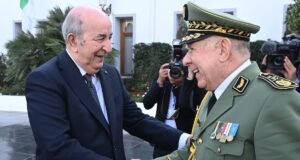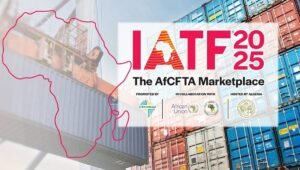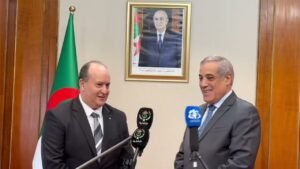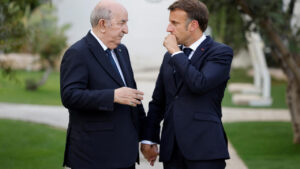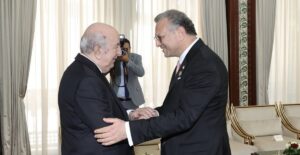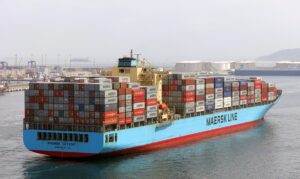Why do President Tebboune's media interviews continue, saying nothing of value to Algerians?!

As usual, Algerian President Abdelmadjid Tebboune addressed his fellow citizens in his "periodic media interviews," taking up an hour and 46 minutes of their time. He didn't bother to say anything of value to his "employees," the representatives of the official media. He merely regurgitated the same empty slogans, both domestically and internationally, in case Algerians had forgotten them, despite hearing them repeatedly since 2019.
Because it lacked useful information for citizens domestically and followers of Algerian affairs abroad, the dialogue, which lasted for hours before being shortened in the editing stage to less than two hours, can be reviewed in a few lines, taking the form of questions that the president's interlocutors did not dare - or did not care - to ask, as they were outside the prior arrangements for the dialogue, to avoid embarrassing the president. Let us begin with the internal affair;
President Tebboune announced, in what became a headline in the newspapers the next day, the holding of a “national dialogue”… in less than a year! Here, anyone has the right to ask: Why announce now an event that is expected to take place a year from now?! Does the intended national dialogue need so much preparation time? Does it relate to matters that have not yet arrived? Will it take so long to narrow down the conference agenda and determine the identity of its invitees? Or are there more important events that Algerians are currently following, and the president expects a better opportunity to capture their attention early next year!! The clear answer to all the previous questions is a resounding “no,” as big as the uproar that will be raised around this “non-event” if it is held a year from now.
President Tebboune devoted the following space to the term “freedom of expression.” After much “beating and beating around the bush” about the obvious, rejecting freedom of expression when it becomes a tool for insults and curses, casting doubt on national affiliation, and disturbing civil peace, etc., he said it in a straightforward phrase: “Anyone who criticizes the freedom of expression file in Algeria is an agent and a fifth column” for an unnamed party!! Although Algerians did not need this blatant, vague and general admission, as the reality translates it through the arrests that target “those who express their opinion freely” in the country of generals that consider freedom a crime!!
President Tebboune did not fail to launch slogans and make "false" promises, which are an extension and repetition of all his previous promises since 2019. Algeria will achieve self-sufficiency in durum wheat this year, and perhaps the rest of the grains next year. It will also be self-sufficient in milk after the "Qatari project" begins operating next year, similar to other promises he made in the sectors of water, electricity, oils, phosphates, gas, etc. Of course, none of these promises made by the president were supported by any figures clarifying, for example: How much durum wheat does Algeria consume? How will it be fully covered this year? How much milk do Algerians consume that it can be said that the Qatari project "Our Country," with its 270,000 cows, will cover it next year? The project's supposed start date. Taking the milk issue as an example, obtaining an official figure for milk consumption by Algerians is a nearly impossible task! The Minister of Agriculture estimated it in mid-2023 at approximately 45 liters per citizen annually, while the ministry's figures two years earlier indicated that it exceeded 167 liters per citizen annually, not to mention the figures from the official Algerian Press Agency, which put the number at 130 liters per citizen annually. So which of these figures is correct? Why? Because estimating annual consumption per person determines the annual needs of 47 million citizens (according to official statistics). These needs, in turn, range from 1.7 billion liters, which the minister in charge set for mid-2023 in parliament, to 4.5 billion liters, which the ministry published a few days ago, passing through another "official" figure of 3.5 billion liters, and a fourth figure from the Cattle Breeders Association, which put the needs at 6 billion liters annually!! Strangely, these figures, and others, such as the number of dairy cows in Algeria, are eerily similar to the figures included in the official statistics from 2013!! It's as if time doesn't move in Algeria, even though the state had limited the number of Algerians at that time to 37 million citizens!! The national herd was set at 900,000 dairy cows, the same number today. The productivity of these cows is around 10 liters per day (the normal rate is 40-60 liters per day), both in the past and currently. The need to achieve self-sufficiency has been, for ten years and up until now, dependent on the availability of two million dairy cows!! Of course, feeding these cows requires cultivating nearly 700,000 hectares of pasture, half of which are not currently available. This maze of numbers justifies the fact that Algeria (according to official statistics) is the fifth largest importer of milk (specifically dried powder) in the world. So how can this reality be transformed into a state of self-sufficiency within a year?! Only God and President Tebboune know the answer!!
Turning to foreign affairs, President Tebboune's performance was no better, with the same empty slogans and contradictory statements that go unnoticed. His expression of relief at the return of Algerian-Spanish relations to normal after a period of stagnation was not followed by any questioning of the reasons that had derailed these relations in the first place and led to their cooling off. What had changed in Spanish behavior that led to this return to normal between the two countries? Or was it Algeria that discovered that its "harmful anger" toward its northern neighbor was unjustified, and thus "cursed the devil" and returned to the right path?
The same questions, albeit more intensely, surround President Tebboune's stance on France. What does it mean for President Tebboune to consider the Algerian-French dispute "completely fabricated"? The only possible question here is: who fabricated it? Beyond President Tebboune's ridiculous considerations, which claim that official France is represented by President Macron, and to a lesser extent by his Minister of Foreign Affairs, denying this capacity for the Prime Minister and the Minister of the Interior!! How will President Tebboune resolve what he called a "misunderstanding" with French President Macron? Will he back down from his recorded positions following France's recognition of Moroccan Sahara, as happened recently with Spain? Or is it the escalating language used by the "official" French government with Algeria that will push the latter's authorities to retreat from their usual "bravado" and descend from the tree of tension with all those who recognize Moroccan Sahara, if that is possible?! President Tebboune concluded this section with a "blatant lie," as popular artist Najat Aatabou put it, when he said: "France and Morocco get along well, and that doesn't bother us. The problem, however, lies in this way of bragging, as it offends the United Nations and international legitimacy." This statement requires no comment.
President Tebboune concluded the external axis by repeating the same "false" slogans regarding Algeria's support for the unity of the African continent, because the reality of his relationship with his neighbors contradicts this slogan entirely. We do not know how severing diplomatic relations and closing the border with Morocco enhances the unity of the continent? How do Algeria's border disputes with Libya and Tunisia contribute to such unity? How does its authorities' humiliating behavior toward sub-Saharan migrants, who are thrown into the desert border with Niger, lead to such unity? How does supporting militias in eastern Congo serve this goal? Finally, how does the attempted assassination of the Mauritanian president inside Algeria and the support for separatist militias in Mali lead to the unity of the continent's countries? Here too (in the external file), President Tebboune insisted on concluding his speech with a lie that became a source of ridicule for those following the meeting on social media: There is a third party spreading false news that leads to a crisis in Algeria's relations with its neighbors in Mali and Niger!! Even if we ignore his usual reference to Morocco as the eternal “third party” whose only concern is to harm Algeria, how can he so lightly accuse the authorities of two neighboring countries of basing their political positions on “fake news”?! Do they lack institutions that are able to understand Algerian behavior towards them? Does a sane person need extraordinary evidence to judge the behavior of the Algerian intelligence and the rest of the Algerian regime’s apparatus as corrupt and harmful to the near and distant neighborhood?! The continued presence of his mercenaries and officers imprisoned in Syrian prisons due to his support for the Syrian tyrant Bashar al-Assad is a glaring example of the absurdity of the slogan “supporting the national Algerian regime to liberate peoples from their oppressive regimes”!!!
In conclusion, it is clear that the continuation of these “farcical” meetings serves neither domestic interests nor external needs. The sole motivation for their continuation can be traced back to one of two factors: President Tebboune’s deeply held internal desire, since he was Minister of Information early in his official career, to speak at length to the media and be at the forefront of the news; or an external mandate from General Chengriha to express what the generals want to say to Algerians. Whatever the justification or motive, the reality is that the only benefit achieved from these “periodic” media meetings is further ridicule of President Tebboune and resentment toward the generals who direct him.
